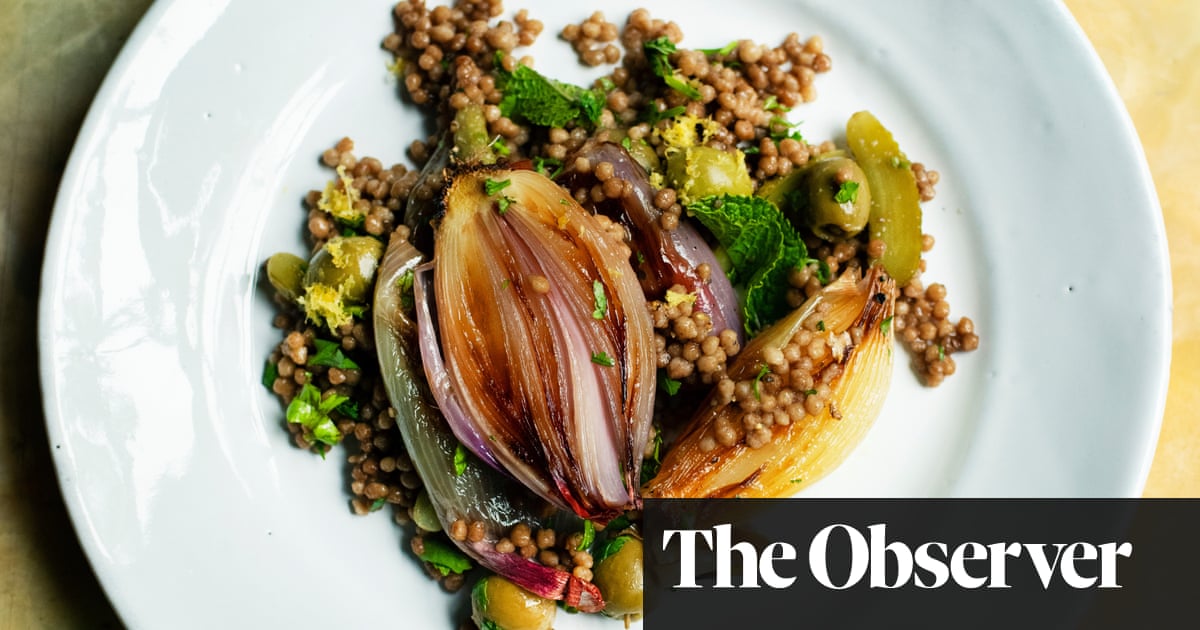I bought a bag of lemons, complete with their leaves – lemons so beautiful I kept them in a shallow dish in the kitchen for several days, just to look at them. I often picked them up to squeeze and sniff. I occasionally caught my finger on the sharp barbs that hide on their stems, like the thorns on roses. I pierced their skin with my thumbnail and inhaled, a smell bright and sharp and cleansing to mark the days I have always felt are the start of a new term.
I roasted the first, sliced in half, with large shallots whose flesh sweetened in the heat of the oven, and tossed them with pearls of fat, chewy couscous. The second and third I peeled with a vegetable peeler, shaved off any pith, then painstakingly set about shredding it with a small, razor-sharp knife. Far finer than I would slice orange peel for marmalade, these tiny strips of lemon were cooked with sugar and water, bubbled down like jam, scenting the house with citrus.
The resulting confit is a preserve of sorts, but made in smaller amounts than jam or orange marmalade. It is sour in the extreme, a contrast to the sweet cake or madeleine or cookie with which it is served. I used it with almond sponge cakes in paper cases, moist and open crumbed, but also wondered about spooning the sticky condiment over a buttermilk panna cotta or spreading it on to crisp meringues before they are sandwiched with cream.
Roast shallots, couscous and lemon
I buy the giant balls of couscous, known to some as mograbia, from a Middle Eastern grocery shop, but they are also available online. Many delicatessens sell a slightly smaller version – still good and perfect for this recipe. It is often labelled giant couscous. Large echalion shallots, labelled as such, are available from many supermarkets. They are milder than the small variety. Serves 2. Ready in 50 minutes
giant couscous (mograbia) 200g
olive oil 4 tbsp
echalion (banana) shallots 6
cornichons 10
mint leaves a large handful
green olives 150g, stoned
lemon the zest and juice of 1
To finish: olive oil a little
Cook the couscous in deep, salted boiling water for about 20 minutes. It should retain a certain bite. Drain and put into a mixing bowl before tossing with a little olive oil. This will stop the beads sticking together.
Peel the shallots and halve them lengthways. Pour the remaining olive oil into a shallow pan and place the shallots cut-side down, cooking over a moderate heat until the cut edges are golden. Turn them over with kitchen tongs and continue cooking, this time partially covered by a lid. They are ready when they are soft and the layers are almost falling apart.
Slice the cornichons in half lengthways and add to the pan, with the couscous, mint leaves and olives. Finely grate the lemon over the pan, squeeze in the juice and stir in with a seasoning of salt and black pepper. Trickle a little olive oil over and serve.
Lemon cakes, lemon confit
Tiny cakes, sweet, light and fluffy, topped with a piercingly sour lemon jam. The cakes will keep for a couple of days in an airtight tin. The confit, a marmalade-like preserve, will keep for a couple of weeks in the fridge. Top them with the jam at the last minute. Makes 12. Ready in 90 minutes
For the confit:
lemons 2, large
orange 1
sugar 100g
juice of 1 lemon and 1 orange 150ml –made up to 200ml with water
Using a vegetable peeler or small, sharp knife, peel the lemons and the orange. Remove the peel in long pieces, taking as little as possible of the white pith underneath.
Put the strips on a chopping board and cut them as thin as possible. It is worth taking your time over this. Put the orange and lemon strips into a pan of cold water and bring to the boil. Pour through a large, fine sieve. Discard the water, then put the strips of peel back into the empty saucepan. Cover once again with water and bring to the boil. Repeat this once more, after which the peel will be soft.
Put the drained peel back into the saucepan with the sugar. Halve the lemons and the orange and squeeze the juice – there should be about 150ml. Pour the juice into the pan, then add 50ml of water and bring to the boil.
Now watch carefully as the juice and water reduce to a thin marmalade-like consistency. Remove from the heat and leave to cool.
For the cakes:
butter 225g
golden caster sugar 225g
orange finely grated zest of 1
lemon finely grated zest of 1
plain flour 110g
baking powder a generous ½ tsp
ground almonds 115g
eggs 3, large
Line a 12-hole bun tin with muffin cases. Preheat the oven to 180C/gas mark 4.
Put the butter (not cold from the fridge) into the bowl of a food mixer, add the caster sugar and beat until light and fluffy. Add the orange and lemon zests. Sift the flour and baking powder and stir the ground almonds into them.
Break the eggs into a small bowl and beat lightly with a fork. With the mixer on a moderate speed, introduce the eggs a little at a time, mixing well between each addition. If the mixture curdles, add a spoonful of the flour and almonds, mixing until it comes together again. Slowly incorporate all the flour mixture.
Divide the cake batter between the muffin cases, smooth the tops lightly with a teaspoon, then bake for 20 minutes until golden and lightly firm to the touch.
Spoon the lemon confit on to each as you serve.
Follow Nigel on Instagram @NigelSlater
